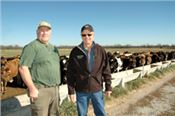|
Turner Keeps It Simple In Large Heifer Replacement Operation

Denis Turner, left, uses practices recommended by University of Missouri Extension at
Turner’s Heifer Haven. MU Extension dairy specialist Ted Probert, right, works with Turner
on research-based practices such as rotational grazing, pasture renovation, synchronized AI and more.
Credit: Photo by Linda Geist
HARTVILLE, MO.
Denis Turner keeps his southwestern Missouri heifer replacement operation simple. For the most part, it is one man for 500-1,000 heifers at Turner’s Heifer Haven, a pasture-based operation where Turner raises heifers for others.
“Make sure every task can be carried out by one person,” Turner says. “Two-man jobs are accomplished on time only about half of the time.”
One employee can feed grain supplements to 500 head of cattle per hour with fence-line feeding—a system of placing feed bunks on the edges of pens along alleys that are wide enough for access with a feed truck. The method makes the feeding process safer for animals, prevents spread of disease from pen to pen, and reduces competition among heifers. It also gives the person doing the feeding quick and easy access to feed bunks.
The design makes things easier for the animals as well as the humans. Heifers never have to walk more than 800 feet to drink fresh water. “The farther they walk, the more energy they use for purposes other than gain,” Turner says. “Wasted steps mean wasted dollars.”
The same employee who accomplishes the grain feeding can also move eight to 10 groups of cattle to new grazing pastures in less than two hours.
With only one employee, the job of caring for cattle on weekends usually falls on Turner. That puts another set of eyes on heifers to evaluate health, gain and reproduction. He also watches for flies and other parasites that reduce growth.
Turner contracts with dairy and beef producers as a background operation. Producers pay him to put pounds on heifers as well as getting them bred and returned to their original herds before calving. “There’s one important thing here, and that’s the cattle,” says Turner.
Turner knows that properly managed forages put pounds on animals through good nutrition. In the early 1990s, Turner was one of Missouri’s first farmers to convert to rotational grazing as part of a two-year project with the University of Missouri, says MU Extension dairy specialist Ted Probert.
“MU Extension found that heifers rotated on fresh grazing paddocks gained more weight and were healthier than those not in a rotational system,” Probert says, adding that Turner became one of the state’s first farmers to convert pastures from toxic Kentucky 31 fescue to legume-based pastures that improve health and increase weight gains. “Denis’ operation is a testament to good grazing management,” he says.
Regular forage tests, also recommended by MU Extension, are critical to Turner’s success. The tests reveal the nutritional content and quality of the forage. “With testing, we can target supplementation to the specific needs of animals. Anything else is a shot in the dark,” says Turner.
Eleven dairies participated in the 1990s project. After it was over, some of the dairy producers asked Turner to raise their heifers on a contract basis.
Just as he did during the study, Turner follows strict protocols, quarantining animals for up to 45 days when they come on-farm, requiring BVD-PI testing and using synchronized artificial insemination. When the number of animals to be bred runs into the hundreds, Probert also helps with the breeding.
With a degree in animal science from Missouri State University and 30 years of experience as a feed representative, Turner knows animal nutrition. His father, Bill, founded Turner’s Special Supply, and Turner has been the mainstay of the company’s nutritional staff since its inception. The business focuses on individualized nutritional plans for dairy and cattle operations, Turner says.
Bill Turner started the business with one pickup and a camper shell. Today, the company mixes around 300 tons of nutrients each month, shipping enough vitamin and mineral supplements for about 120,000 head of cattle daily.
Turner advocates for the one-person plan to care for cattle, but his job description centers around serving others and his philosophy is to give back to his community, both personally and professionally.
Turner was 18 years old in 1975 when he and his wife, Lynn, were married. They spent the next four years commuting more than an hour each way to Missouri State University to complete degrees in agriculture and English. His wife retired from teaching in 2008 after 29 years of service, and she likes nothing more than helping with the heifers. The couple has three children, all MU graduates.
Turner stresses the importance of being a lifelong learner and networking with others. He encourages those entering agriculture to seek out the knowledge and experience of extension educators, fellow farmers and reliable bankers.
“My education had just started when I was graduated from college,” Turner says. “MU Extension was critical to furthering my education. Even now I feel like I am going back to school when I attend extension events.”
Turner credits much of his success to former state extension dairy specialist and now interim Provost Jim Spain, retired MU Extension dairy specialist Barry Steevens, and former extension veterinarian David Hardin, as well as current extension specialists such as Probert, livestock specialist Randy Wiedmeier and economist Joe Horner.
Turner and his wife participate in numerous community groups, including extension. Probert says Denis is the “prototype of engagement with MU Extension.”
“It’s sad more people aren’t involved,” says Turner. “People’s lives are busy, but our philosophy is that we have to give back. There were a lot of people who lifted us up.” ∆
|
|